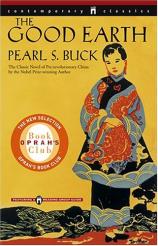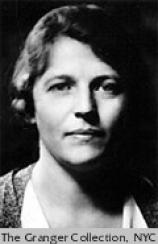Reading Group Guide
Discussion Questions
The Good Earth

1. The novel begins with Wang Lung's expectation of rain, the daily boiling of water for his father, and his bathing for his wedding. What might this water imagery foreshadow?
2. Why does Wang Lung feel compelled to purchase the rice field from the House of Hwang? Why does he at first regret it?
3. "And so this parcel of land became to Wang Lung a sign and a symbol." What does the author mean by this?
4. Wang Lung considers the birth of his daughter to be a bad omen. How does he come to regard this girl, who grows up to become a fool?
5. As the family works and begs in the city, what do they think of the foreigners they encounter? What purpose does the author serve in including these descriptions?
6. The abundance of food in the city contrasts with the characters impoverished lives. Discuss the emotionally complex relationship Wang Lung develops with the city.
7. The poor laborers in the city lack knowledge even of what they look like, a fact illustrated by the man who mocks himself in a mirror. How does a new self-awareness come to manifest itself?
8. When Wang Lung becomes swept up with the mob and enters the rich man's house, is the gold he receives there a curse or a blessing? Do you feel any pity for the rich man? What do you think the author intended you to feel?
9. After O-lan steals the jewels, do they function as a bad omen or good luck? Why does O-lan want to keep the two pearls? Why is Wang Lung so astonished by this? What do the pearls signify?
10. As O-lan dies, she bemoans her lack of beauty and says she is too ugly to be loved. Wang Lung feels guilty, but still cannot love her as he did Lotus. Neither woman can control destiny. Lotus was an orphan who had been sold into prostitution because she was beautiful, and O-lan had been sold as a kitchen slave because she was plain. For whom do you feel sympathy? Why?
11. Toward the end of the novel we encounter the belief that things will change "when the poor become too poor and the rich are too rich." Discuss the ambivalence of this statement -- a mixture of both hope and despair -- and how it reflects upon the whole of The Good Earth.
12. Pearl Buck wrote a first-person novel from the point of view of a Chinese man, which was controversial because she was of a different culture. What are some of the challenges of this undertaking? How might this book have been different had it been written by a Chinese person? Compare Buck's novel to other books written by authors striving to transcend culture or gender (e.g.: Arthur Golden's Memoirs of a Geisha, James Baldwin's Giovanni's Room, Wally Lamb's She's Come Undone).
The Good Earth
- Publication Date: September 15, 2004
- Genres: Fiction
- Paperback: 368 pages
- Publisher: Washington Square Press
- ISBN-10: 0743272935
- ISBN-13: 9780743272933








